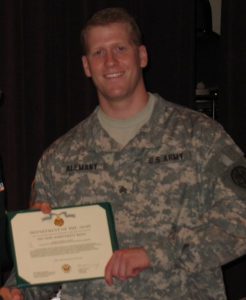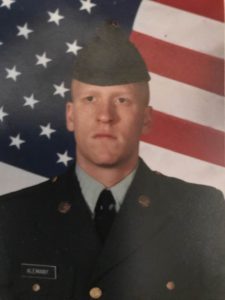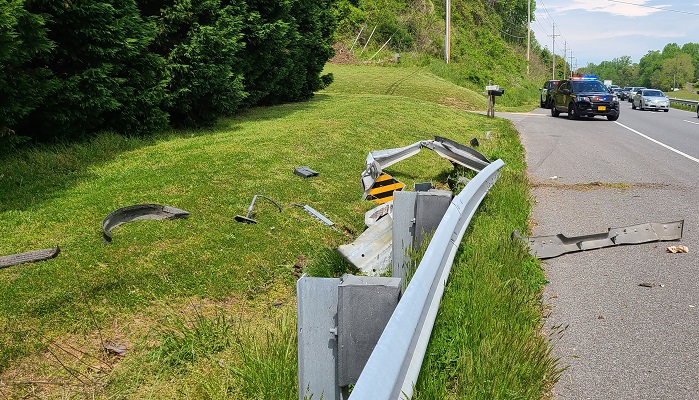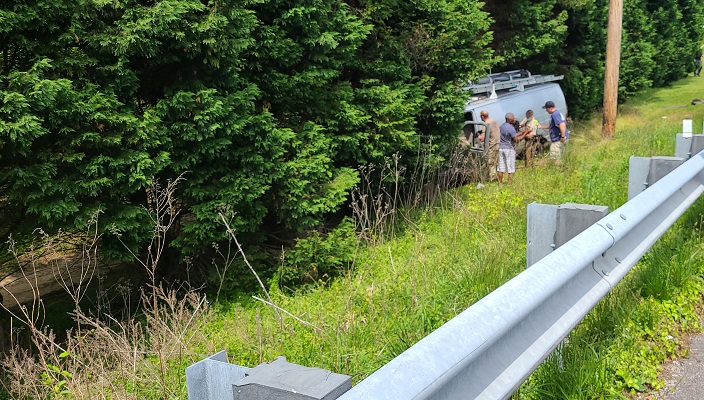MDNG Soldiers Lend Helping Hands After Car Crash in Huntingtown
Article by Sgt. Chazz Kibler, 29th Mobile Public Affairs Detachment
According to the Center for Disease Control and Prevention, at least 1.35 million people are killed each year on roadways worldwide. However, thanks to a couple of Soldiers in the Maryland Army National Guard, one less death was added to those statistics when they reacted to a single-vehicle car crash that occurred in Huntingtown, Maryland, on April 29, 2021.
“So, it’s weird because it was kind of a blur,” said U.S. Army Sgt. Joseph Alemany, a medical laboratory specialist, assigned to the Maryland National Guard’s 104th Medical Company Area Support based in Reisterstown, Maryland. “And when I kind of play this back in my mind, I don’t think there was any conscious thought on my part to actually stop [the car], it was kind of instinctive.”
U.S. Army Maj. Terry Schiffbauer, a physician assistant in the Medical Detachment, also in Reisterstown, and Alemany’s actions that day received praise from senior leadership throughout the MDNG organization.
“I thought that it was really neat that they pulled over and rendered aid until E.M.S. arrived,” said U.S. Army Major Jamie Saffel, commander of the MDNG’s State Medical Detachment. “It was just right timing, and helping people is what we’re in the business of doing here in the Maryland National Guard.”
In Alemany’s 19 years of military service, he has split time between the active duty Army and the MDNG.

 “Having those military drills with patient assessment and combat casualty care allows for muscle memory to kind of take over,” said Alemany. “And then you go, ‘Okay, where do I start?’ A.B.C. Airway, breathing, circulation, and these things are drilled over and over again. So, when these events do occur, your actions are instinctive, and the military training that I had is the reason why I knew what to do at the time.”
“Having those military drills with patient assessment and combat casualty care allows for muscle memory to kind of take over,” said Alemany. “And then you go, ‘Okay, where do I start?’ A.B.C. Airway, breathing, circulation, and these things are drilled over and over again. So, when these events do occur, your actions are instinctive, and the military training that I had is the reason why I knew what to do at the time.”
Alemany and Schiffbauer’s actions that day possibly saved lives on two fronts. Before the car crash, Alemany and Schiffbauer were on their way to deliver COVID-19 vaccines to the Saint Mary’s County Health Department.
“I have not taken the time to process people calling me a hero,” said Alemany. “It’s weird when you hear it about yourself. I would never describe what we did as heroic. I would say what we did was in accordance to what any other sympathetic human being would have done.”
Alemany used the car crash as a teachable moment.
“The things that we do in the military as far as training and readiness are important,” said Alemany. “But they are important for the times that you don’t think you’re going to need them, and it could be the difference on whether or not you save someone’s life.”


